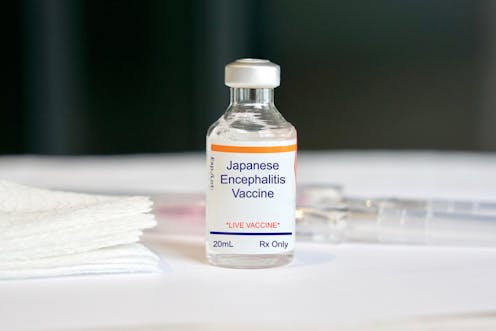Do I or my child need a Japanese encephalitis vaccine?
- Written by Lara Herrero, Research Leader in Virology and Infectious Disease, Griffith University

This week we heard two Australians[1] have died from the mosquito-borne Japanese encephalitis virus. The virus has now been detected in four states.
Authorities are concerned we’ll see more cases[2] around the country and have earmarked extra funding[3] to roll out vaccines to those at risk.
Who is recommended to have the vaccine depends on factors including their age, occupation and location. Here’s what you need to know about accessing the vaccine in Australia, ahead of further announcements expected in coming days.
Read more: Japanese encephalitis virus has been detected in Australian pigs. Can mozzies now spread it to humans?[4]
What is Japanese encephalitis?
Japanese encephalitis is caused by[5] the Japanese encephalitis virus. It spreads through mosquito bites. It cannot be transmitted from human to human.
Most people[6] will show no symptoms. However, 1% will develop swelling of the brain (encephalitis). Of those who have symptoms, up to 30% will die and a further 50% will have life-long neurological disability. The infection is particularly severe in the elderly or the young.
The virus had previously been found in Southeast Asia, Western Pacific regions, and in the Torres Strait[8].
However, because of its spread into new regions further south, last week Japanese encephalitis was designated[9] a communicable disease of national significance.
Tell me more about the vaccines
Currently, seven Japanese encephalitis virus vaccines[10] are licensed for use in humans globally. Two of these – Imojev and JEspect[11] – are approved for use in Australia by the Therapeutic Goods Administration.
Imojev is approved for those from nine months of age and is given as a single dose. JEspect is approved for use from two months of age and is given as two doses, 28 days apart. JEspect can be given to pregnant women, if necessary.
The level of immunity from these vaccines varies. A single dose of Imojev can provide immunity for up to five years[12]. Whereas JEspect requires two doses to provide immunity for two years[13], with some studies[14] suggesting a third booster after 12 months provides longer protection.
Read more: Zika, dengue, yellow fever: what are flaviviruses?[15]
These vaccinations come with some side effects. These include redness, pain and mild swelling at the vaccination site. Other side effects include headache, fatigue and muscle pains.
These vaccines vary in the way they are prepared. Also, different strains of the virus are used to make the different vaccines. This can ultimately affect how well they work to prevent disease if there is a change in the current circulating virus strain.
Who can get the vaccine?
Vaccination is currently recommended for high-risk groups, which currently includes[16]:
laboratory workers who work with the virus
travellers who will spend one month or more in an endemic region
people living or working in the outer islands of the Torres Strait.
Before the current spread of Japanese encephalitis you could get the vaccine at GP clinics specialising in travel medicine. It costs A$300-350[17], which includes a GP visit and the vaccine itself.
But with the spread of the virus in mainland Australia, the definition of high risk will likely change and the vaccine may be available to those high-risk groups via their GP or at work. At this stage we don’t know if the vaccines would be free, but that will be confirmed in coming days.
For instance, piggery workers[18] are among workers expected to be considered high risk and be offered the vaccine.
That’s because Japanese encephalitis virus infects pigs (it has been detected in piggeries in NSW, Queensland, Victoria and South Australia). The virus then enters the mosquito population when they bite pigs, which then later bite humans and spread it to us.
A national group[19] of communicable disease, vaccine and virus experts is considering whether a wide vaccine rollout is needed and if so, how this might work.
National cabinet is also expected to discuss the issue and make further announcements shortly.
How can I protect myself, even without the vaccine?
There are currently no specific treatments for people with Japanese encephalitis. Symptoms are managed with supportive care, including fluids and pain relief.
Vaccination is one form of protection. However, the most useful protection[20] comes from not being bitten by a mosquito in the first place.
Read more: The best (and worst) ways to beat mosquito bites[21]
Read more: How to mozzie-proof your property after a flood and cut your risk of mosquito-borne disease[22]
References
- ^ two Australians (www.abc.net.au)
- ^ more cases (www.health.gov.au)
- ^ earmarked extra funding (www.smh.com.au)
- ^ Japanese encephalitis virus has been detected in Australian pigs. Can mozzies now spread it to humans? (theconversation.com)
- ^ is caused by (www.health.gov.au)
- ^ Most people (link.springer.com)
- ^ Shutterstock (www.shutterstock.com)
- ^ Torres Strait (conditions.health.qld.gov.au)
- ^ was designated (www.health.gov.au)
- ^ seven Japanese encephalitis virus vaccines (www.nature.com)
- ^ Imojev and JEspect (immunisationhandbook.health.gov.au)
- ^ up to five years (www.ncbi.nlm.nih.gov)
- ^ two years (www.sciencedirect.com)
- ^ some studies (www.sciencedirect.com)
- ^ Zika, dengue, yellow fever: what are flaviviruses? (theconversation.com)
- ^ includes (immunisationhandbook.health.gov.au)
- ^ A$300-350 (academic.oup.com)
- ^ piggery workers (www.abc.net.au)
- ^ national group (www.health.gov.au)
- ^ most useful protection (theconversation.com)
- ^ The best (and worst) ways to beat mosquito bites (theconversation.com)
- ^ How to mozzie-proof your property after a flood and cut your risk of mosquito-borne disease (theconversation.com)
Read more https://theconversation.com/do-i-or-my-child-need-a-japanese-encephalitis-vaccine-178888
















